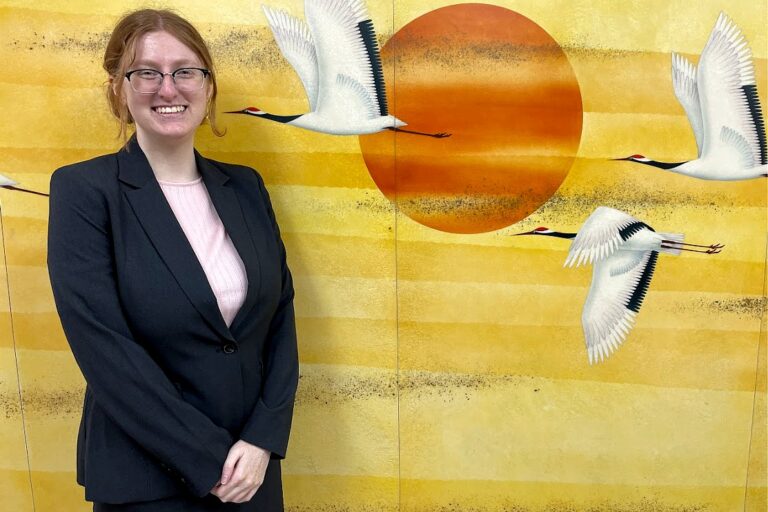College of Arts & Letters’ Assistant Professor of Linguistics Betsy Sneller was awarded a $99,908 grant from the National Endowment for the Humanities (NEH) Digital Humanities Advancement Grant (DHAG) program for her project, “Building and Disseminating an App for Ethnographic Remote Audio Recording,” that will develop an open-source code to create a self-recording mobile app, which will be critical for researchers who work with spoken data.
“This work fills a really important gap in the kinds of tools that are currently out there,” Sneller said. “A lot of current solutions, like web apps, only allow short recordings, which is a problem for things like oral histories that usually last upwards of an hour. And our app includes time-aligned automated transcription on the back end, which helps researchers process their data as it’s coming in much more easily.”

This project grew from the success of Sneller’s ongoing MI Diaries research project with Associate Professor of Linguistics Suzanne Wagner, which has been collecting “audio diaries” from Michigan residents since April 2020 to track changes to people’s day-to-day experiences and language during the COVID-19 pandemic. The MI Diaries project uses an innovative data collection, whereby participants self-record their audio diaries at home using an MSU-developed app for mobile devices.
As the success of the MI Diaries project became clear, the team began hearing from other humanities researchers whose work in oral history or long-form spoken data could benefit from having their own mobile app. One of these researchers, Laura Yares, Assistant Professor of Religious Studies at MSU, successfully adapted the MI Diaries app for her own research on learning about Judaism through the cultural arts. Yares will serve as an advisory council member for the DHAG grant.
“We really see this as an opportunity to democratize this kind of data collection — so that researchers who may not have access to the kind of support we have at MSU will still be able to implement their own remote data collection apps.”
Betsy Sneller, Assistant Professor of Linguistics
The DHAG program supports innovative, experimental, and/or computationally challenging digital projects, leading to work that can scale to enhance scholarly research, teaching, and public programming in the humanities.
Russ Werner, a network administrator at MSU who supported the pilot app development, will work with this new grant to expand and improve the app. The team has plans to add features like gamification and participant management to help researchers keep participants interested. At the end of the two-year funding period, the code will be published on GitHub for anyone to use, along with a user guide, so that humanities researchers can adapt the basic code to make their own research apps.


Not only will the app be useful for the linguists it was originally designed for, but also for researchers in other disciplines, especially oral historians and ethnographers. This round of funding will be used to make adjustments to the platform and mobile apps to allow other projects to make use of the platform and software the team has developed. A pilot program allowing other projects to participate in the development and implementation of the software also is a core part of this project.
In addition to long-form audio data, such an app could easily be used to collect photographs or videos from participants remotely, making use of the native features of existing smartphones. This is a very exciting opportunity for helping others conduct this sort of research at a distance. Prior tools to do this work have not been easy to use or comprehensive in their feature set. Expanding and developing the tool that has been used for the MI Diaries project will ensure more projects will be able to conduct this kind of work.
“This pilot program will provide essential feedback from the broader community on the needs and wants from a system like this.”
Scott Schopieray, Assistant Dean for Academic and Research Technology
“We really see this as an opportunity to democratize this kind of data collection — so that researchers who may not have access to the kind of support we have at MSU will still be able to implement their own remote data collection apps,” Sneller said. “We’re excited to see what other projects grow from this idea.”
Critically, the team will work with an advisory council of humanities researchers both at MSU and at other institutions, which will provide insight into the kinds of features they would most like to see in an app for their own research and will help test out the process of setting up their own version of an app.
“As we develop the platform, our team will connect and collaborate with PIs from other projects who are looking to conduct ethnographic research at a distance,” said Scott Schopieray, Assistant Dean for Academic and Research Technology in MSU’s College of Arts & Letters and current advisory council member for the project. “This pilot program will provide essential feedback from the broader community on the needs and wants from a system like this.”
The team currently is recruiting external members for the advisory council and invites any humanities researchers whose work may benefit from this kind of mobile app to apply by completing the online application. The application deadline is March 15, 2022.


